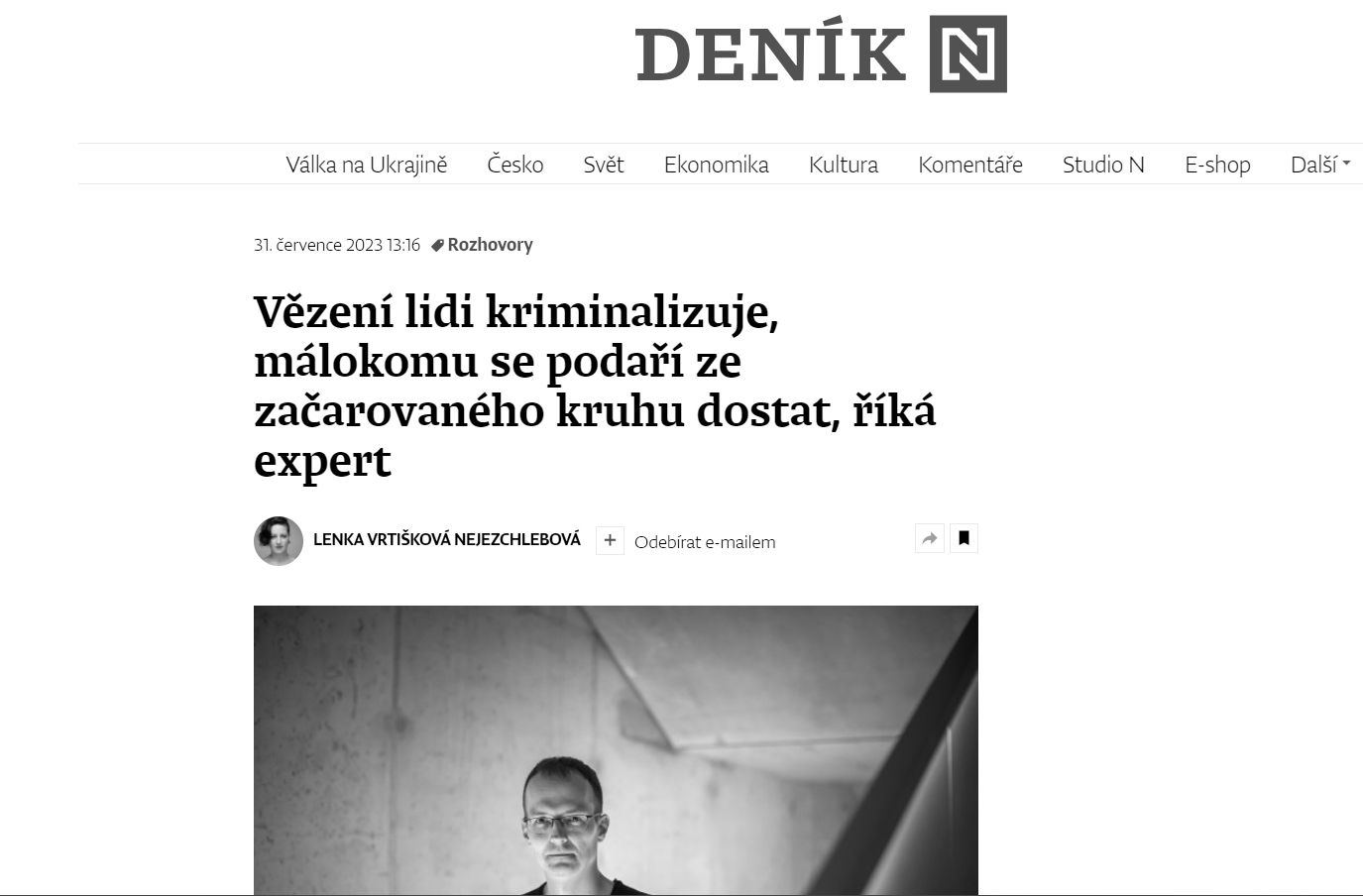On 31 July 2023, Deník N published an extensive interview with researcher Jiří Mertl, who is in charge of the research and evaluation of our project. In the interview, he talks about the stereotypes and prejudices that are associated with prisoners and prison in society, as well as what prevents prisoners from successfully reintegrating into normal life after returning from prison.
Interview with J. Mertl: Prison as a warehouse for the “useless;” people are often led to crime by hopeless situations

Deník N’s editor, Lenka Vrtišková Nejezchlebová, conducted a detailed and information-rich interview with Jiří Mertl, in which she also mentions a number of outputs from the research he conducted as part of this project and in the context of his academic activities.
In the interview, Jiří Mertl says, among other things:
If you’re asking about the stereotypes associated with prisoners and prisons, two come to mind. First, it’s a comfortable life, with a TV in the cells, sometimes even luxurious. I’ve been to about twenty prisons as part of my job, and believe me, I wouldn’t want to spend a week, let alone years, in any of them. Even if I had a TV in my cell, which is not usual at all. I saw a TV in a common room, but not in a cell. It’s a depressing environment. Luxury and comfort are a myth.
If you look at the prison population, the majority are people who have encountered nothing but negative events in their lives since early childhood. Excluded localities, poverty, poor access to education, racism, family breakdowns, addictions, stays in educational institutions, and so on. All of this leads to traumatization. These people are stuck in an almost hopeless situation; they have no motivation, no resources, and no contacts to solve it. It leads them to criminal activity. […] The social system does not work where it is most needed. These people then have little choice but to make a living in an illegal or semi-legal regime. Foreign research then uses the term “warehousing,” i.e., storage, or storing people whom the system sees as unnecessary in prison.
The official calculation of the cost of one imprisoned person is on average 3 million Czech crowns. But that’s how much the state apparatus costs: to catch a person, to indict them, to convict them, to put them in prison, to imprison them and to release them. Estimates, which include other costs, can run up to tens of millions of crowns. The problems include returning to the labour market, lack of tax payments, and the high probability that they will end up on social assistance, that they will continue to commit crimes, and that their family will follow the same trajectory. It is a burden on the whole of society from a variety of perspectives. Investing in social work, prevention, and a more robust social system would pay off significantly in the long run. As well as, for example, better funding for probation programs…
In the current project, we work with the principle of case management. We work with people on an individual level, on a case-by-case basis. The essence of this method is to establish a relationship – in a professional sense. If this is successful, people tend to be motivated to join the program and to collaborate on change. A specific feature of this project is the interconnectedness of cooperation, where we start working with clients while they are serving their sentence, accompany them through the process of release, and then work with them even after their release. At all stages, we try to identify their needs and work on them together, which then increases the chances that the person will not return to prison. At the moment, 58 people are successfully cooperating with us in the project, and seven people have successfully completed it. If you multiply this by the aforementioned costs of imprisonment, we are currently saving the public budget almost 200 million Czech crowns.
You can read the full interview on Deník N’s website. (The full content is available to subscribers only.)
Jiří Mertl
Sociologist and expert in social work and social justice issues, Jiří Mertl works as a scientist and assistant professor and lecturer at the Department of Applied Social Sciences at the Faculty of Humanities, Charles University. He is an analyst at the Czech Association of Organizations Working in Penal Affairs (AOOV) and a guarantor of the AOOV “Housing and Employment” working group.








